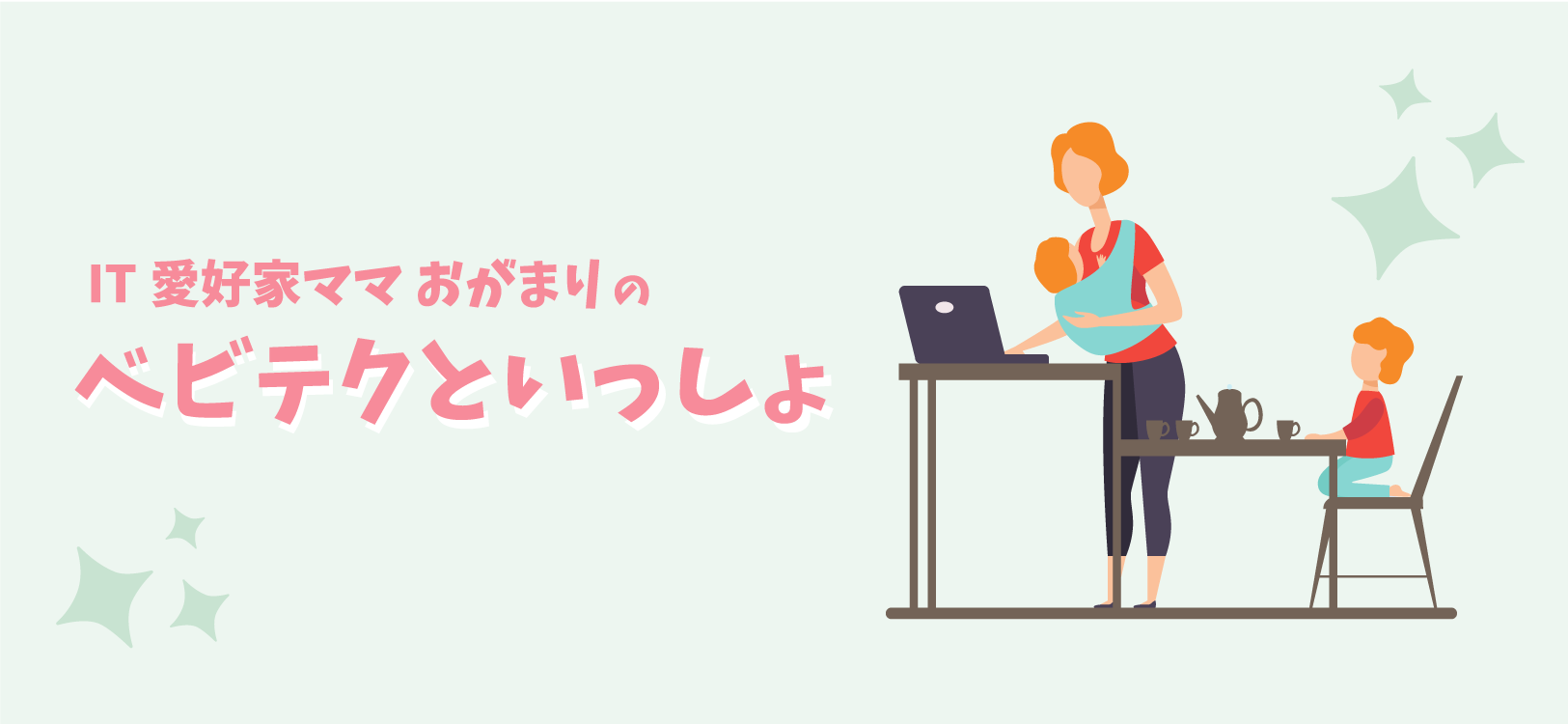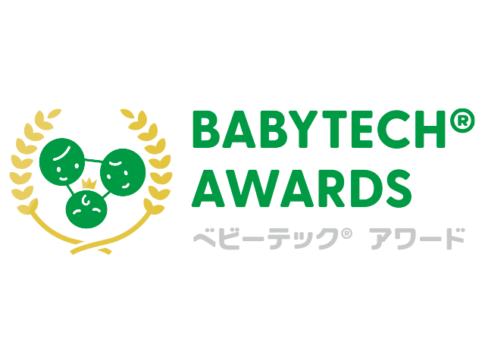- The following is content from the press release -
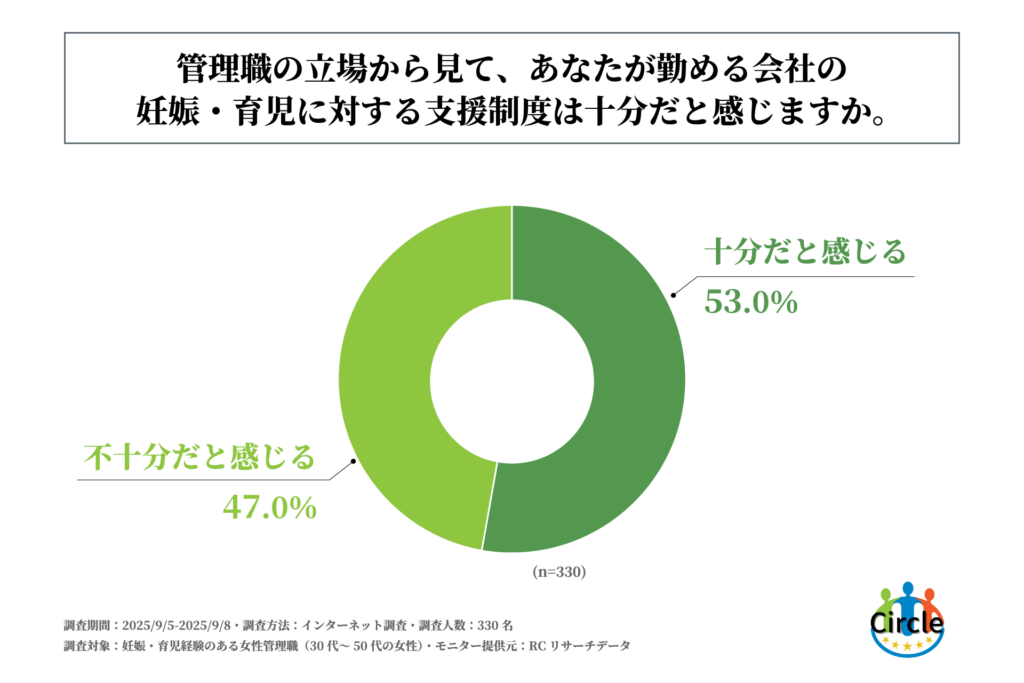
Circle, LLC (Headquarters: Saku City, Nagano, Japan; Representative: Misa Yamada) conducted a "Survey on Women's Pregnancy, Childcare, and Careers" among female managers in their 30s to 50s who have experienced pregnancy and childcare. The survey revealed contemporary issues that female managers in their 30s to 50s who have experienced pregnancy and childcare face in continuing their careers while raising children.
background
With the increasing importance of "human capital" in corporate management in recent years, the development of an environment in which a diverse range of human resources can play an active role over the long term has become an essential element for sustainable corporate growth. In particular, supporting female employees to continue their careers even after life events such as pregnancy and childcare is a pressing management issue for many companies, and many companies are introducing maternity and childcare leave systems and other systems to support work-life balance. On the other hand, however, there still seems to be a gap between the existence of such systems and the actual continuation of careers. Circle, LLC conducted a "Survey on Women's Pregnancy, Childcare, and Careers" targeting female managers who have experienced pregnancy and childcare and are currently in a position to manage subordinates, in order to clarify the realities of career continuity for women who have gone through pregnancy and childcare in the modern era. The survey was conducted among female managers who had experienced pregnancy and childcare and were currently in a position to manage subordinates.
Survey Summary
- Nearly 40% of female managers in their 30s to 50s who have experienced pregnancy and childcare have quit their jobs because of pregnancy or childcare
- The main challenges in balancing work and pregnancy/child care were "time constraints and difficulty in adjusting schedules" and "high mental and physical workload.
- More than 80% of female managers in their 30s to 50s who have experienced pregnancy and childcare feel that support systems for pregnancy and childcare in the workplace today are better than in the past.
- About half of female managers in their 30s to 50s who have experienced pregnancy and childcare feel that the support system for pregnancy and childcare at the company they work for is inadequate from a managerial standpoint.
- The most common challenge in supporting subordinates in balancing work and pregnancy/child care is "difficulty in dealing with sudden absences or early departures.
- The main things that women think will be effective for continuing their careers while pregnant or raising children in the future are "introduction and expansion of flexible work styles" and "building an organizational culture that allows women to use systems without hesitation.
Survey Summary
Survey period: September 5 - September 8, 2025
Survey method: Internet survey
Survey target: Female managers in their 30s to 50s who have experienced pregnancy and childcare.
Number of persons surveyed: 330
Monitors provided by: RC Research Data
Nearly 40% of female managers in their 30s to 50s who have experienced pregnancy and childcare have quit their jobs because of pregnancy or childcare
First, in response to the question asking whether they have ever quit their jobs because of pregnancy or childcare, 62.71 TP6T responded "no" and 37.31 TP6T responded "yes. These results indicate that nearly 40% of female managers in their 30s to 50s who have experienced pregnancy and childcare have quit their jobs because of pregnancy or childcare.
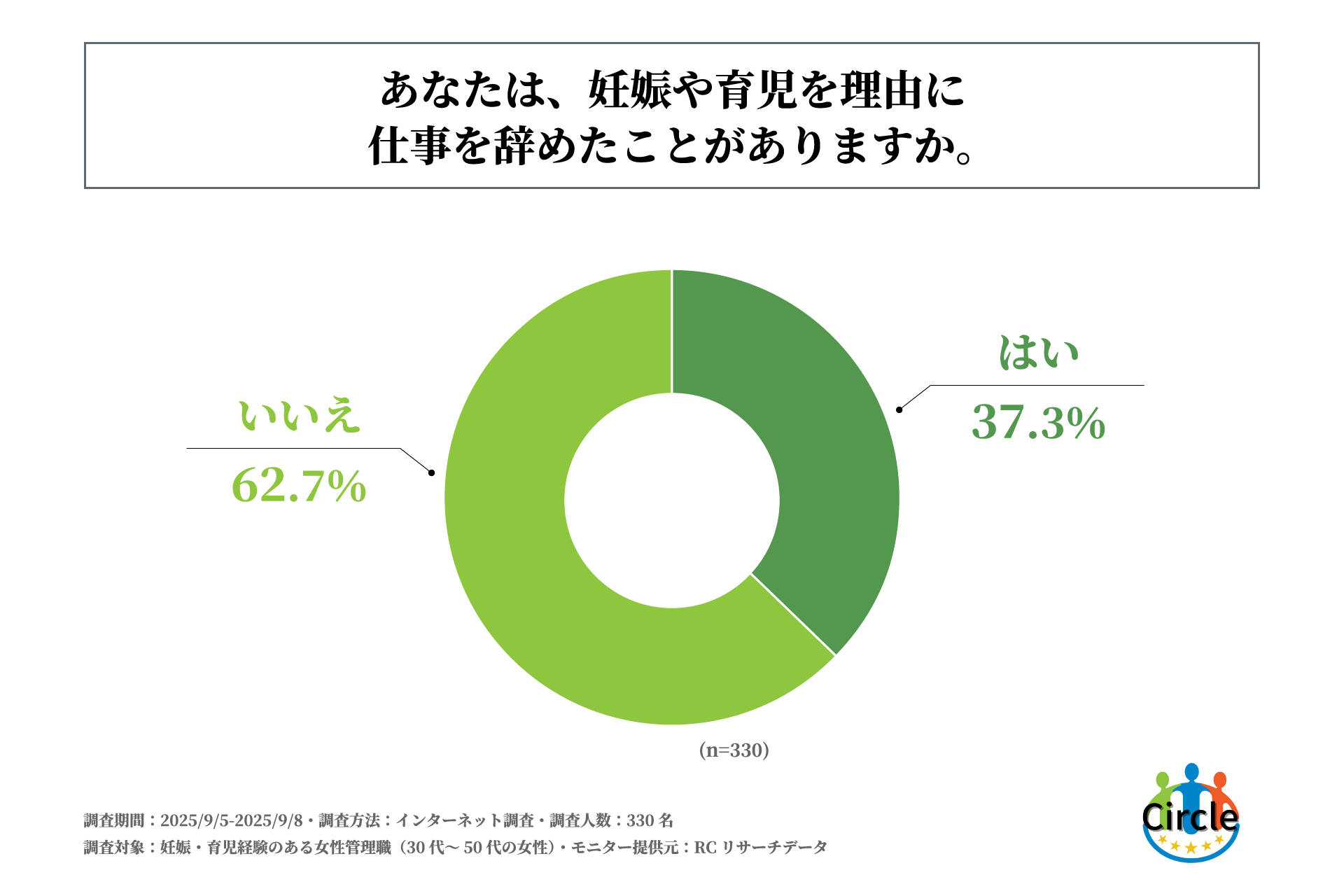
The main challenges in balancing work and pregnancy/childcare were "time constraints and difficulty in adjusting schedules" and "high mental and physical workload.
Next, in response to a question asking about challenges in balancing work and pregnancy/childcare, the top response was "time constraints and difficulty in adjusting schedules" at 67.91 TP6T, followed by "heavy mental and physical burden" at 60.91 TP6T, and "lack of cooperation within the family" at 47.91 TP6T. These results indicate that the main challenges perceived by female managers in their 30s to 50s in balancing work and pregnancy/childcare were "time constraints and difficulty in adjusting schedules" and "heavy mental and physical workload.
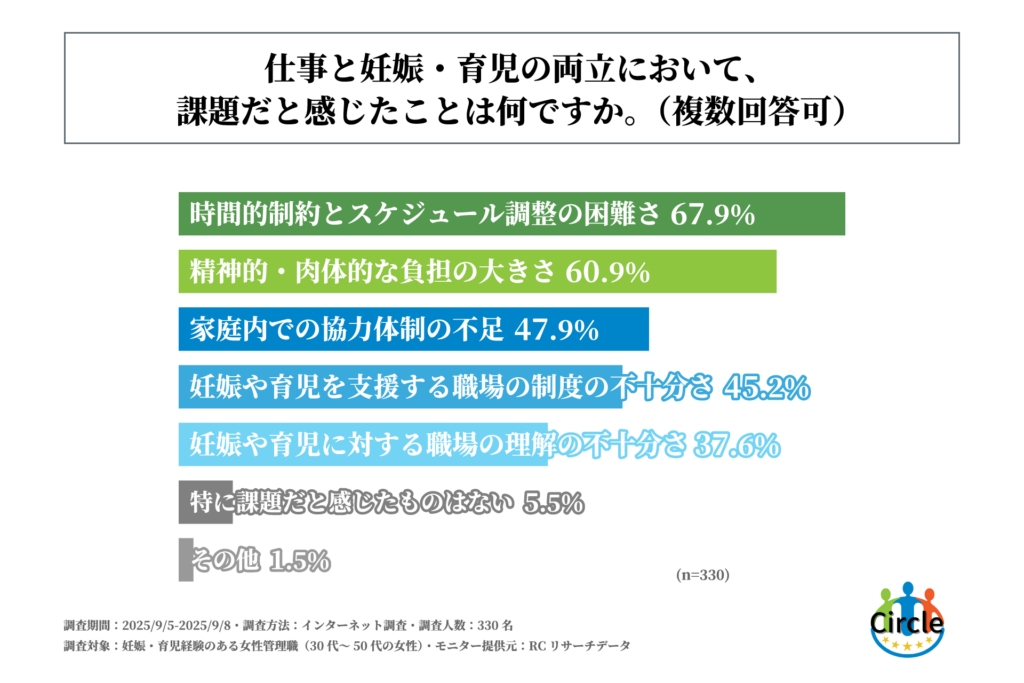
More than 80% of female managers in their 30s to 50s who have experienced pregnancy and childcare feel that support systems for pregnancy and childcare in the workplace today are better than in the past.
The next question, "Do you feel that support systems for pregnancy and childcare in the workplace today are better developed than in the past?" resulted in 82.41 TP6T for "Yes" and 17.61 TP6T for "No." These results indicate that more than 80% of female managers in their 30s to 50s who have experienced pregnancy and childcare feel that support systems for pregnancy and childcare in the workplace today are better developed than in the past.
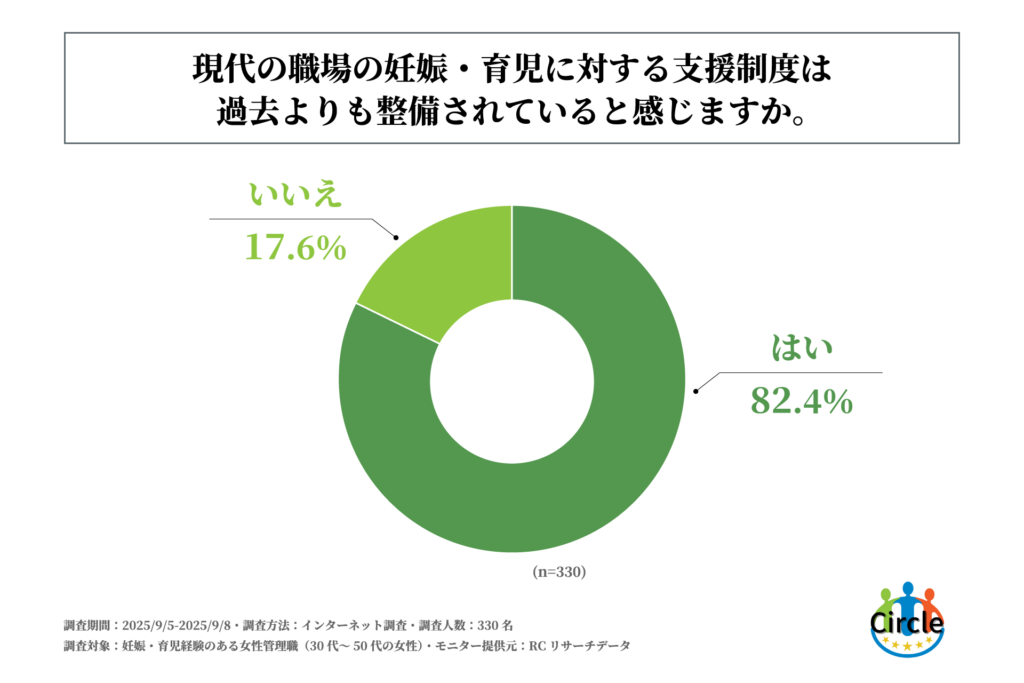
About half of female managers in their 30s to 50s who have experienced pregnancy and childcare feel that the support system for pregnancy and childcare at the company they work for is inadequate from a managerial standpoint.
In response to the question, "From the standpoint of a manager, do you feel that the support system for pregnancy and childcare at the company you work for is adequate?" 53.01 TP6T responded "adequate" and 47.01 TP6T responded "inadequate. These results indicate that more than 451 TP6T of female managers in their 30s to 50s who have experienced pregnancy and childcare feel that the support system for pregnancy and childcare at the company they work for is inadequate from their perspective as a manager.
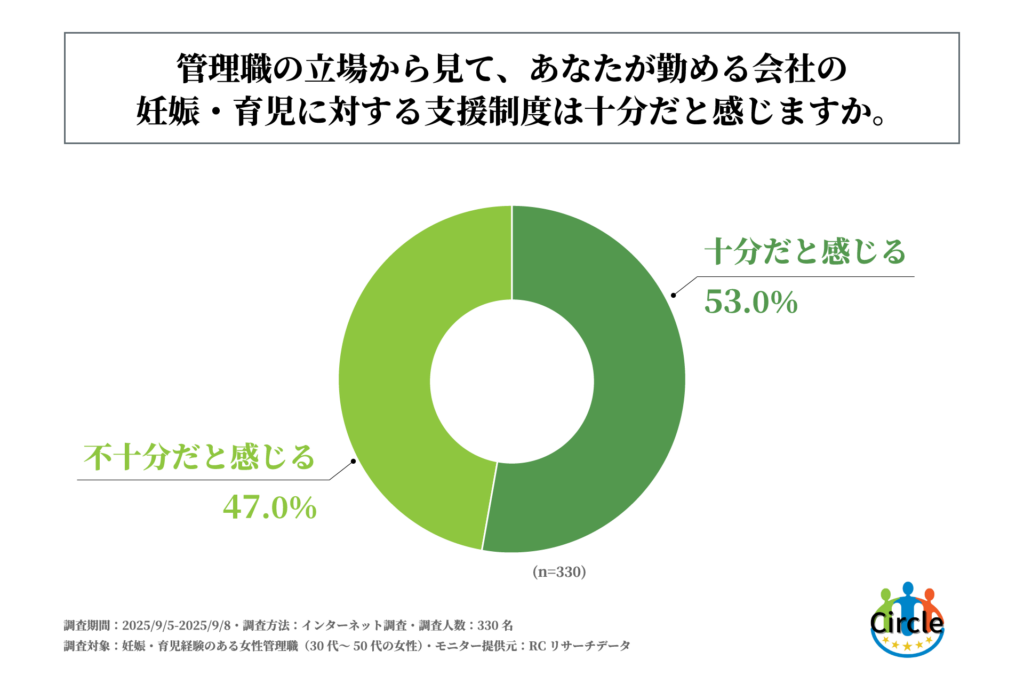
The most common challenge in supporting subordinates in balancing work and pregnancy/child care is "difficulty in dealing with sudden absences or early departures.
Next, in response to the question "As a manager, what do you feel are the challenges in supporting your subordinates in balancing work with pregnancy and childcare," the top response was "difficulty in dealing with sudden absences or early departures" at 49.41 TP6T, followed by "difficulty in adjusting work to take into account physical discomfort and hospital visits during pregnancy" at 34.61 TP6T, and "difficulty in taking over before and after maternity/childcare leave" at 33.01 TP6T. The third was "Difficulty in handing over work before and after maternity/paternity leave" at 33.0%. The results show that among female managers in their 30s to 50s who have experienced pregnancy and childcare, "difficulty in dealing with sudden absences and early departures" was the most common challenge in helping subordinates balance work and pregnancy/childcare.
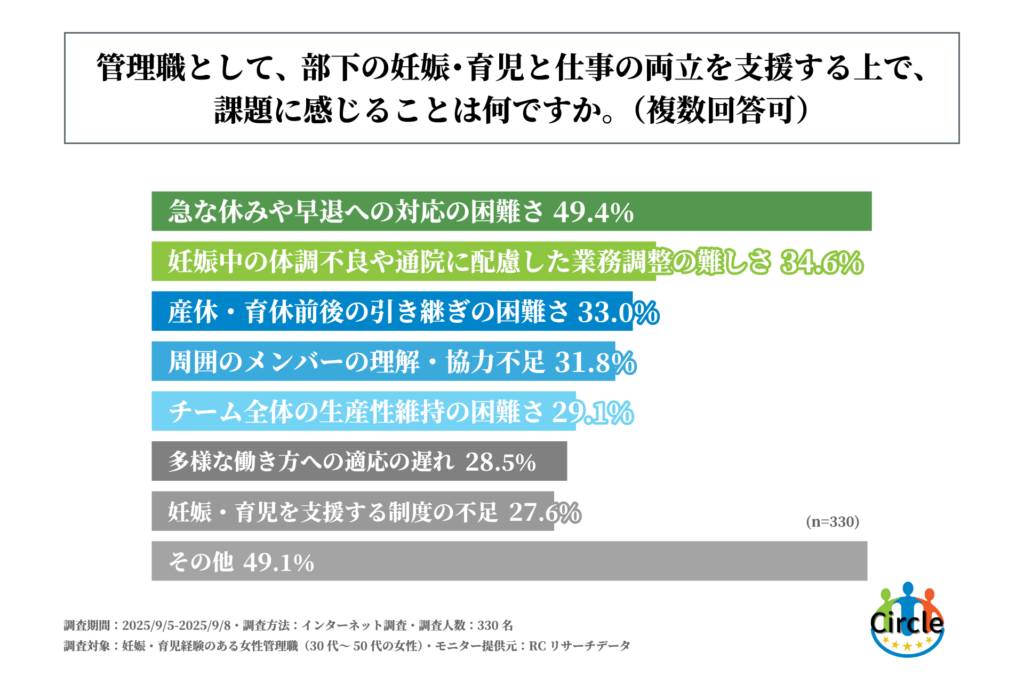
The main things that women think will be effective for continuing their careers while pregnant or raising children in the future are "introduction and expansion of flexible work styles" and "building an organizational culture that allows women to use systems without hesitation.
In response to the last question of the survey, "What do you think is effective for women to continue their careers while pregnant or raising children in the future? The third was "improving understanding of pregnancy and childcare among members" at 44.2%. The results revealed that the most effective ways for women to continue their careers while pregnant or raising children in the future are "introduction and expansion of flexible work styles" and "establishment of an organizational culture that allows women to use systems without hesitation.
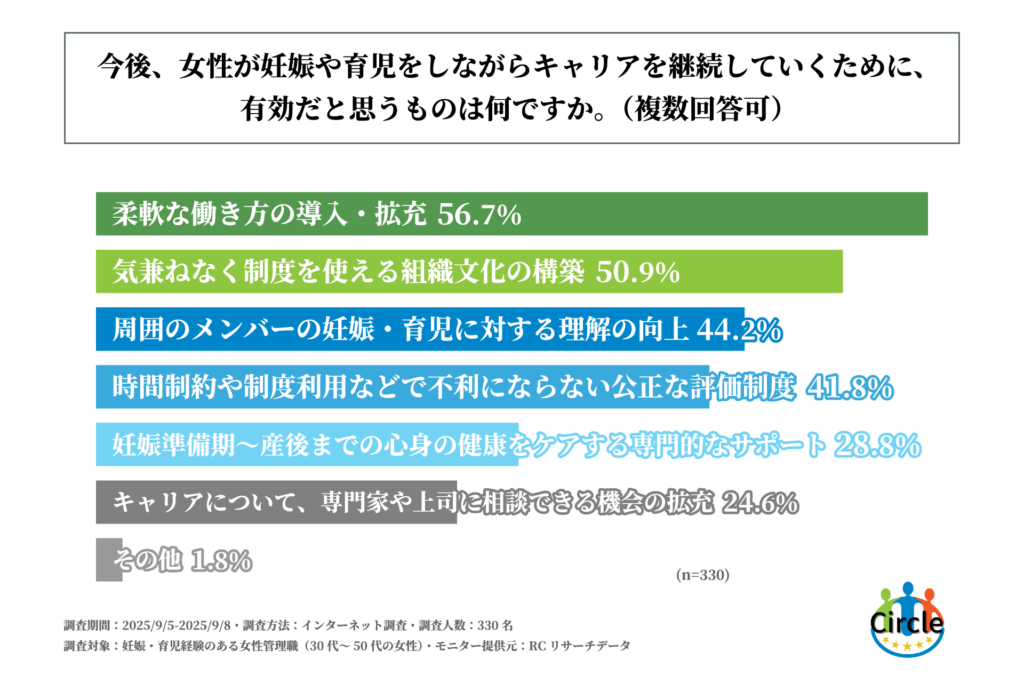
summary
The survey revealed that nearly 40% of female managers in their 30s to 50s who have experienced pregnancy and childcare have left their jobs because of pregnancy or childcare. Time constraints" and "mental and physical strain" were cited as the main challenges in balancing work and childcare. In addition, while more than 80% of female managers in their 30s to 50s who have experienced pregnancy and childcare feel that their workplace support system for pregnancy and childcare has improved compared to the past, about half of them consider their current system inadequate, suggesting that the system may be disorganized and that there may be issues with its actual operation. Among female managers in their 30s to 50s who have experienced pregnancy and childcare, the most common issue in supporting their subordinates in balancing work and pregnancy/childcare was "dealing with their subordinates' sudden leave or early retirement," and the most common effective measures to support work and childcare were "introducing flexible work styles" and "building an organizational culture that allows employees to use systems without hesitation. The survey revealed that the main effective measures to support work-life balance are "introduction of flexible work styles" and "building an organizational culture that allows employees to use systems without hesitation.
These results suggest that support for balancing childcare and work today requires not only the expansion of systems, but also a two-fold approach: mental and physical care for individual employees and a support system for the entire organization, including management. Circle Maternity BIZ" provided by Circle LLC will contribute to solving both of these issues. To address the "mental and physical burden" identified in the survey, Circle Maternity BIZ provides direct support for each employee through one-on-one health counseling and care programs by nationally certified health professionals. In addition, through seminars for companies, we support management issues faced by managers and the fostering of an "organizational culture that allows employees to use systems without hesitation," which many employees desire, thereby contributing to the realization of a workplace environment where women can continue to work with peace of mind.
Company conducting the survey

Circle LLC
Location: 2597 Seto, Saku, Nagano, 385-0035 Japan
Representative Employee: Misa Yamada
Business activities: Provision of total support programs for preconception to postpartum women, seminar management business
URL:https://maternity-circle.jp/about/
Circle Maternity BIZ
Circle Maternity BIZ, a support program for companies developed by Circle LLC, is a service that provides comprehensive support for female employees from preconception to postpartum period. Through one-on-one online health consultations, nationally certified specialists carefully attend to everything from physical management in preparation for childbirth to postpartum recovery and mental care. In addition, through seminars for companies, we support the creation of an organizational culture in which female employees can feel free to use the maternity care system. By creating an environment in which each female employee can continue her career with peace of mind, we contribute to the revitalization of the organization and the promotion of sustainable human resource recruitment.
For more information, please see below.
Circle Maternity BIZ:https://maternity-circle.jp/




